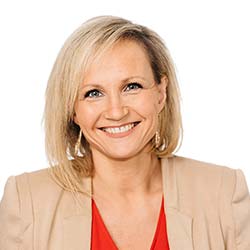This month:
Some assume stock markets are due a significant correction and the spectre of inflation shocks has begun to loom along with further volatility. Here, experts from our wealth manager panel explain how they are plotting a course for their clients’ portfolios.
Expert investment views:
Experts make the case for companies involved in decarbonising the world
The portfolio risks posed by sudden inflation hikes are set out
Investors urged to weigh several factors supporting buoyant stock markets
Professionals explain how they are bracing for continued volatility ahead
Featuring this month’s experts:




1. Leading the way to “climate-neutral”
The urgency of climate neutrality efforts is not a new concept, but it has certainly become more visible in recent years. With 2020 the first year of the “countdown decade” to the major 2030 carbon neutrality deadline, the debate has only intensified in the first six months of the year.
Increasingly, COVID-19 and climate issues have become inextricably linked, a trend that has unsurprisingly fuelled conversations around ESG investing. Naturally, in a post-COVID-19 world, climate-neutral policies and the sustainable use of resources will remain high on the political and corporate agenda. In this new era, to enhance economic activity, European governments would do well to boost support for higher infrastructure investments and climate-neutral technologies.
Renewable developers are now increasingly making significant investments to decarbonise electricity production, while offshore wind has quickly become a competitive clean energy source, accelerated by declining costs and more efficient turbines
The three main infrastructure areas of current focus for governments are most likely to be renewables, 5G and public railway transport. Renewable developers are now increasingly making significant investments to decarbonise electricity production, while offshore wind has quickly become a competitive clean energy source, accelerated by declining costs and more efficient turbines. Meanwhile, 5G offers many opportunities for telecommunications providers and European governments across the board are transforming railways to be even more economical compared to their aviation and vehicular counterparts.
Of course, reduced political support or the removal of carbon emission targets remain risks, but given the direction of travel of this debate, it seems a risk worth taking. Therefore, we recommend buying into a range of stocks that boost a more efficient use of resources and provide, develop or operate technologies which contribute to decarbonising the world. If ESG-conscious investing is an area you would like to delve into deeper, these stocks would certainly be a good place to start.

Dean Turner
Economist at UBS Global Wealth Management
2. Brewing inflation risk beyond the near term
A sudden rise in inflation is a key risk for any unprepared portfolio. Currency devaluation, more local supply lines, tariffs and trade-war could all increase costs. Potentially, higher inflation could mean central banks are forced to tighten monetary policy in order to abide by their mandates. In the near term (1 to 2 year) the outlook across the post-COVID-19 globe is disinflationary which is reflected in very low government bond yields. One way to observe this is through US real GDP growth and its lead on underlying inflation. With the consensus forecasting large GDP declines, US core (ex food/energy) consumer price inflation is expected to drop from its current position of around 2% to near zero in 2021.
However, equity investors should not despair. From data going back to 1965, a 0-2% inflation range for each country has seen annual US S&P 500 and German DAX returns of 10.3% and 11.9% respectively. For the moment, global equities are in a sweet spot of current low inflation enabling policymakers to step-up monetary and fiscal stimulus to lift markets higher. The MSCI All-Country World index has already retraced more than half of its losses since the market peaked in mid-February.
Looking forward, when consumer confidence recovers and unemployment rates decline following the lifting of lockdowns, pent-up demand could lead to higher inflation in the years ahead
Nevertheless, the risk of higher consumer price inflation over the medium-term (3-5 years), primarily due to policy responses to COVID-19, has increased and is a potential risk for portfolios. Essentially, more money is being directed to Main Street (consumers) over Wall Street (banks), the opposite of what happened during the Global Financial Crisis (GFC) in 2008, when funding was used to repair balance sheets of the financials. Looking forward, when consumer confidence recovers and unemployment rates decline following the lifting of lockdowns, pent-up demand could lead to higher inflation in the years ahead. To hedge against this risk, we favour inflation protected government bonds and gold.
Sources: Refinitiv and Smith & Williamson (correct at 2 June 2020)

Daniel Casali
Chief Investment Strategist at Smith & Williamson Investment Management

Top Tip
It’s important you always feel your wealth manager is doing everything possible to maximise your returns and minimise your risks, but even more so at times like these. If you don’t feel you and your capital are being proactively looked after, why not speak free of charge to a few of our panel firms to explore getting a better deal?

Lee Goggin
Co-Founder
3. Why are US markets nicely misbehaving?
The number of COVID-19 deaths globally continues to be grim and the economic impact worrying, but stock markets have surged in value, with the US leading the way. In fact, as we write, Wall Street has recouped all of its losses for the year.
When the global economic outlook remains as uncertain as is currently the case, this is a strange scenario. If companies do not know what their future cash flows will be, how can markets discount those cash flows and place any value on those assets? We believe investors in the US should take into account three factors before assuming there must inevitably be a substantial correction:
- It is no secret that cyclical stocks have significantly underperformed defensive equities, despite the clawback in the last couple of weeks. For example, again as we write, the financial services sector has seen a -14.87% drawdown in 2020, year-to-date, versus the information technology sector, which has outperformed by 12.18%. The average stock remains around only 75% of its value at the August 2018 high. The increases are not universal.
- The equity risk premium is elevated. Aside from the uncertainty, the expectations of future corporate earnings from S&P500 companies are very low and it is unlikely that this has led to exuberance. So, it must be that the excesses actually lie in the valuation of safe-haven bonds.
- If you look at an aggregate of valuations, investor leverage, cash sitting on the side-lines, investor sentiment and the supply of equities, which all speak to the level of speculation present, the sum is at its lowest level since the 2011 selloff.
The average stock remains around only 75% of its value at the August 2018 high. The increases are not
The next few weeks will tell us whether a second wave of the pandemic could cause countries to press pause on the reopening of their economies. And while our base case scenario has been that – all things being equal – the US market should not have reached these dizzying heights quite so quickly, we continue to weigh up the balance of probabilities and are hedging our bets that this rally could continue, not least due to the massive fiscal injections and accommodative monetary policy in place, both in the US and around the world.

Rebecca Cretney
Investment Counsellor, Nedbank Private Wealth
4. Bracing for bumpy markets ahead
Equity markets have taken heart from the signs of a gradual return to work aided by the wall of money that central banks and governments continue to throw at the problem. For example, the European Central Bank (ECB) lived up to expectations, announcing a further EUR 600 billion in its Pandemic Emergency Purchase Program (PEPP).
The rally in equities has built a degree of momentum and may continue for some time, supported by continued low interest rates
Changes to the FTSE 100 Index reflect the changes in our lives. Travel and tourism suffer under coronavirus while people in lockdown have more time to do home improvements. This week, cruise ship operator Carnival, EasyJet and Meggitt, which makes parts for aircraft, fell out of the FTSE 100, with Kingfisher (owner of B&Q) and HomeServe making their way in. If the recovery continues then in a few months’ time this may reverse. After all, Kingfisher had been in the index until March when it dropped out. This makes us question the use of index trackers who tend to add stocks that have gone up already and remove them when they have already fallen. We continue to advocate taking a more selective long-term approach to equity investment.
The rally in equities has built a degree of momentum and may continue for some time, supported by continued low interest rates. Central bank support for bonds and credit markets is here for the long term. As stock markets recover, they become more vulnerable to setbacks and we expect volatility to be high in the months to come.

Jonathan Marriott
Chief Investment Officer at LGT Vestra
Important information
The investment strategy explanations contained in this piece are for informational purposes only, represent the views of individual institutions, and are not intended in any way as financial or investment advice. Any comment on specific securities should not be interpreted as investment research or advice, solicitation or recommendations to buy or sell a particular security.
We always advise consultation with a professional before making any investment decisions.
Always remember that investing involves risk and the value of investments may fall as well as rise. Past performance should not be seen as a guarantee of future returns.
